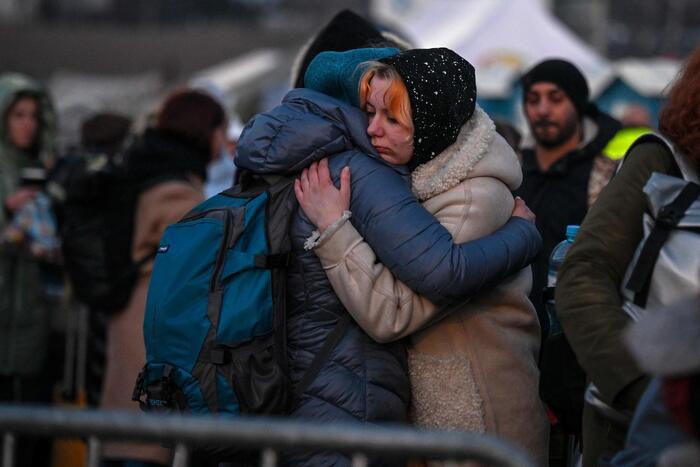A woman stops for a moment, sits on a wooden box and covers her face with her hands.
She hides her tears from her daughters who remained a few meters behind.
At their side, a Polish soldier, in camouflage, pushes a shopping cart filled with the family's backpacks and suitcases.
He then accompanies them to the buses that will take them to safety, but even further away from their Ukraine.
Medyka, on the Polish border, is - today more than ever - the meeting of peoples, the place where people from all over the world are busy welcoming those fleeing a war that is as bloody as it is absurd.
In twenty days this strip of land has completely transformed.
The exodus of the beginning of the war, when hundreds of thousands of Ukrainian refugees lined up at the border,
From the green gate that separates Ukraine from Poland, only women and children continue to arrive.
Husbands and children are still on the other side, defending their nation.
Medyka is the arrival point for those arriving from Lviv, the city that woke up yesterday to the sound of anti-aircraft sirens after the bombing a few kilometers from the Polish border.
The latest nightmare that forced many families to leave the country.
In the city, however, there are still many, many refugees from all over Ukraine and it is not excluded that a possible new escalation could lead them to flee.
Dozens and dozens of gazebos have been set up on the road that leads from the border to the sorting point, with volunteers distributing bread, food and basic necessities.
Little eggs and chocolate bars are reserved for children, while someone wears the role of the pirate Jack Sparrow and makes them smile.
Women are given free phone cards with which to connect with loved ones.
In the improvised reception center there are also wheelchairs for the grandmothers, the babushkas, exhausted by hours and hours of travel.
"We are destroyed - says a woman sitting on the sidewalk just after the border -. We are waiting for our relatives from Warsaw, but we will be back home soon, I'm sure".
A little farther on, eight people huddle in a white van, ready for a journey that will take them to Krakow, to the nearest reception center.
At the helm is the 39-year-old mother with her little more than 12-year-old daughter beside her.
Behind,
Buses bound for stations continue to arrive and depart at a steady pace.
The military sort the passengers according to the country of arrival, they thank them and go up for yet another trip away from the bombs.
A Spanish flag appears on a motorhome.
Above her are Susana and her husband Michael.
They organize, through the web, a network of campers to bring refugees to reception centers.
Five Italian boys from the "Train of Memory" arrive next to a gazebo.
When the project was completed, they too wanted to give their contribution among the volunteers.
And as the buses leave the border, a group of German boys take up their guitar and ukulele to snatch a smile of hope from those forced to flee.

